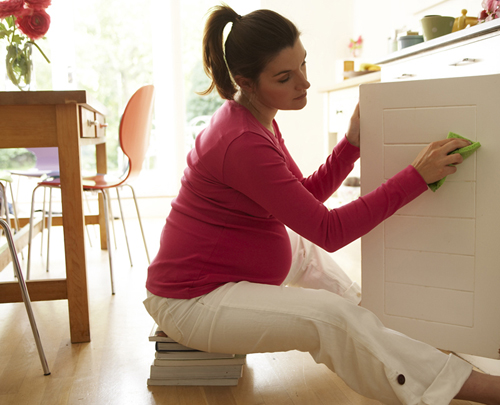You are 36 Weeks and 2 Days 26 days to go…
Have you started nesting? The need to provide a safe, comfortable space for your new baby is a primitive desire.
Your baby today
Although almost invisible in the image, a very thin layer of
vernix covers your baby. At first this helped to reduce the amount of
water leaving your baby’s skin, but now it helps to prevent direct
contact with the skin and amniotic fluid.

The nesting instinct usually begins in the final weeks of pregnancy, accompanied by a surge of energy and an uncontrollable urge to get your home in ship shape.
Give in to your inner
domestic goddess: cook, clean, organize, and de-clutter, but take it
easy. If you spend hours on your hands and knees scrubbing, you may find
yourself in labor sooner than you’d expected. Some men develop a
nesting instinct, but unfortunately this tends to be associated with
cars and garden sheds. If this happens to your partner, at least you can
look forward to a sparkling-clean car, spruced-up patio, and manicured
lawn.
Nesting not happening
for you? Pay the professionals to do a spring cleaning. Or forget it:
your baby won’t care whether the cupboards are clean.
Every nook and cranny of your home will get your attention once the cleaning bug hits you!

Plaster casts!
Preserve your belly
for posterity by making a plaster belly cast. You can either buy a kit
or (far cheaper) purchase the plaster separately; it’s all available
online.
You will need:
Plaster of Paris bandages, cut into several strips
Large tub of petroleum jelly
Bucket of warm water
An assistant or two (not essential, but can be useful for speeding up the process and bringing refreshments).
Here’s how to do it:
Strip down except for some old underwear (the smaller, the better)
Apply petroleum jelly liberally to your belly and breasts
Assume a comfortable pose
One by one, dip the plaster of Paris strips into the water, then apply, overlapping the layers until you have a thick coating
Sit and wait for it to dry—it’s a good excuse to take a rest
Slip it off, when it’s rock hard and paint it if you’d like.
You are 36 Weeks and 3 Days 25 days to go…
You’ll find that your beautiful belly is intruding on your life more and more, affecting your movements and eating patterns.
Your baby today
A short portion of the umbilical cord is lying close to the
mouth, which makes this baby appear to have a rather grumpy looking
expression. The placenta is seen to the right of the image partially
obscuring the view of the face.

You might be getting a little frustrated
by your size around now, which can make everyday activities more
difficult. Simple maneuvers, such as fitting through doors or getting
off the sofa, can be more difficult and you may find that everything
takes a bit longer to achieve. All you can do is be patient and focus on
getting through the next few weeks. You’ll soon have your body back to
normal.
During pregnancy, it’s
common to eat more often than previously but to eat less at each meal.
This is because your uterus has grown so much that all your other organs
have moved around and are squashed into much less space. Your stomach
simply has less room in it to fit the food so you can’t eat as much
before feeling full. When your stomach empties you may find yourself
hungry again. It’s fine to snack, but make sure you’re reaching for
healthy foods and not the cookie jar!
Getting comfortable behind the steering wheel
will become increasingly challenging in the late stages of pregnancy.
Keep trips as short as possible or take regular breaks if you need to
travel for any length of time. Always wear your seat belt .

VBAC
Doctors used to think that if you had one baby by cesarean,
all future babies must also be born that way. But doctors now know that
90 percent of women who delivered by cesarean are candidates for VBAC,
or vaginal birth after caesarean. Depending on the reason for your prior
cesarean, you may be able to deliver vaginally, especially if you have
no major medical problems, the baby is healthy and in head-down
position, of normal size, and any condition that necessitated your last
cesarean isn’t present. If you have diabetes, high blood pressure, or
are pregnant with multiples, you are not a candidate for VBAC.
… Your baby
Working out with Mom
Your baby will usually move several times in the 20 to 30 minutes
after you exercise. By keeping the intensity of your exercise at a
moderate level you will not compromise the oxygen supply to your baby.
When you exercise too hard and for too long, you may compromise this
exchange and the result is the baby’s movements will fall below their
usual levels.
If you’re concerned and
unsure, keep a log of how much your baby is moving and compare this to
the activity levels after exercise. If the level falls below what you
consider to be “normal,” speak to your doctor.